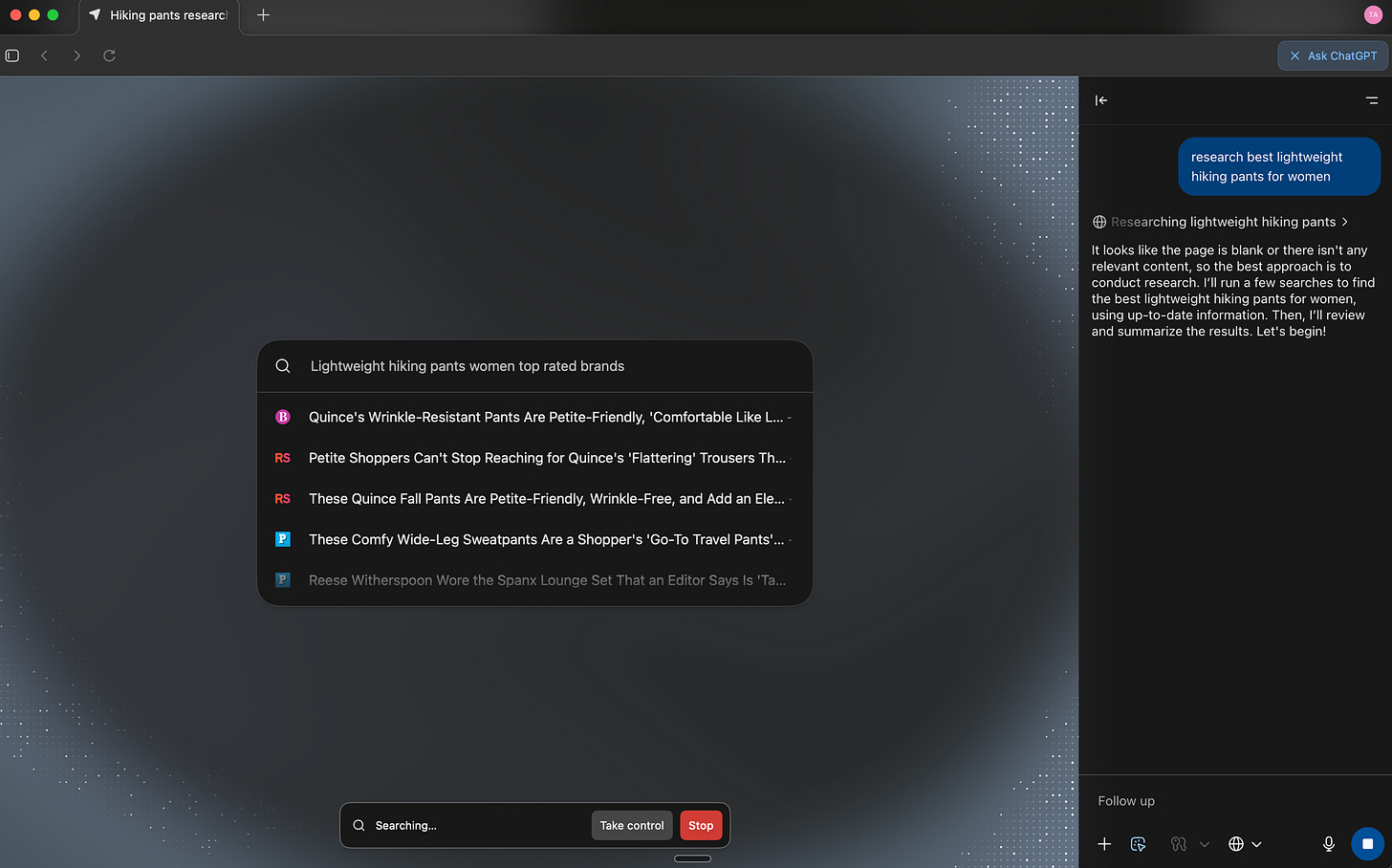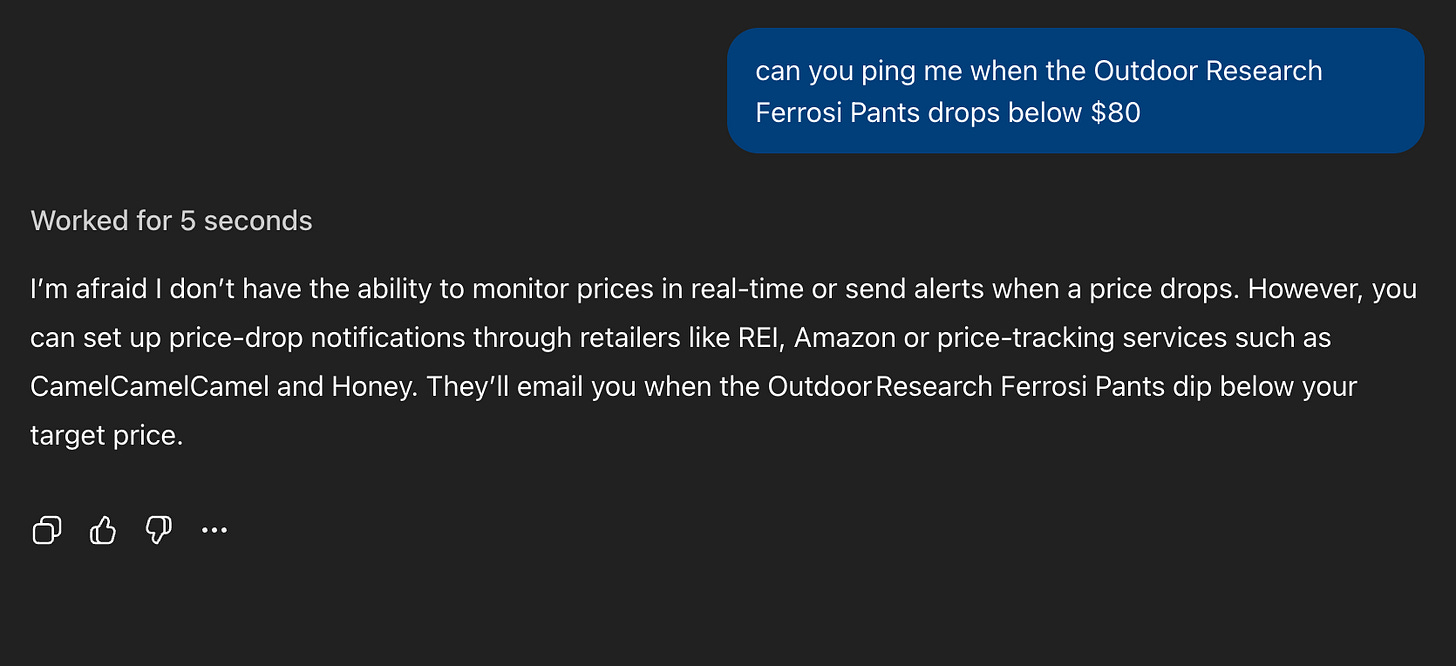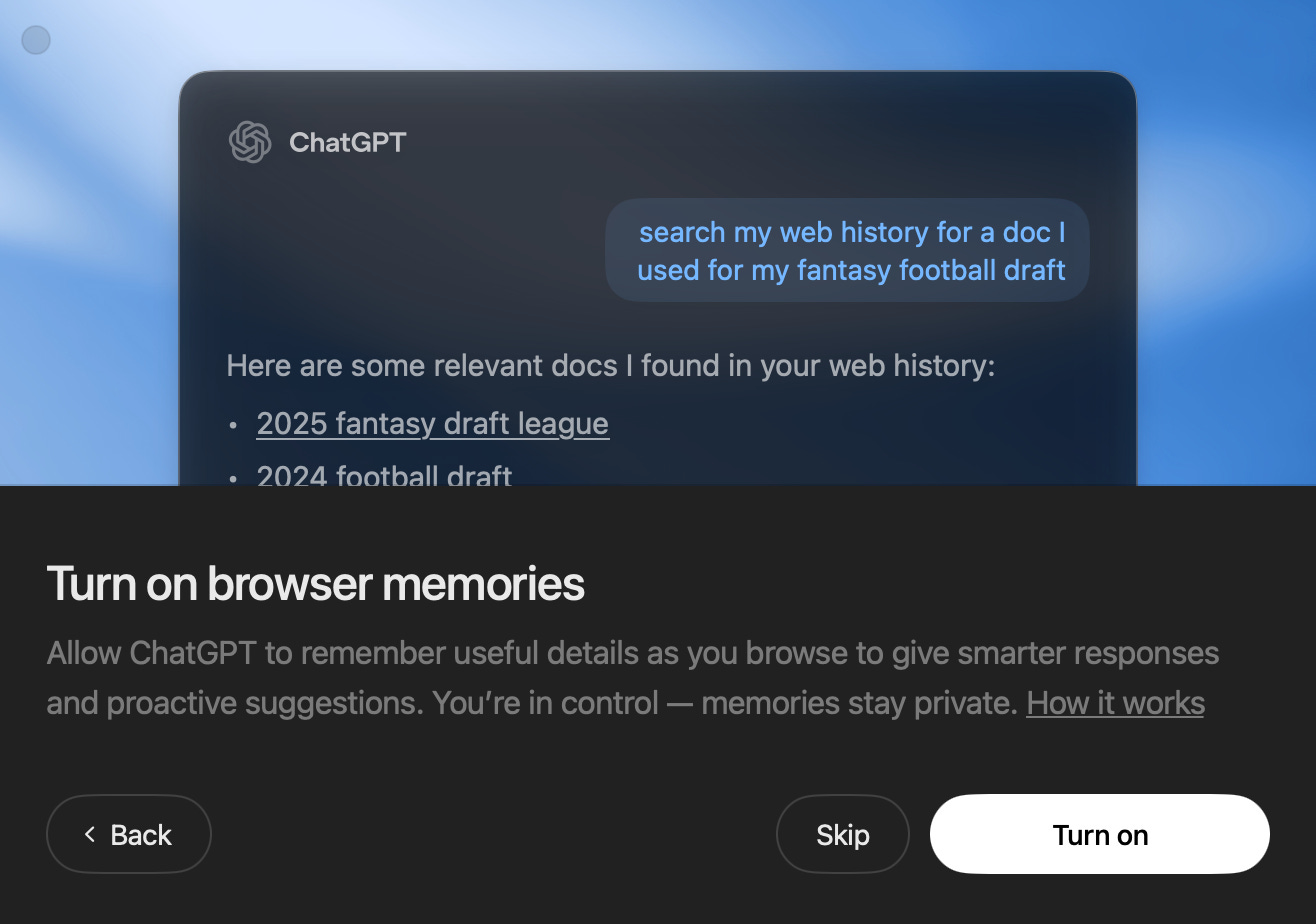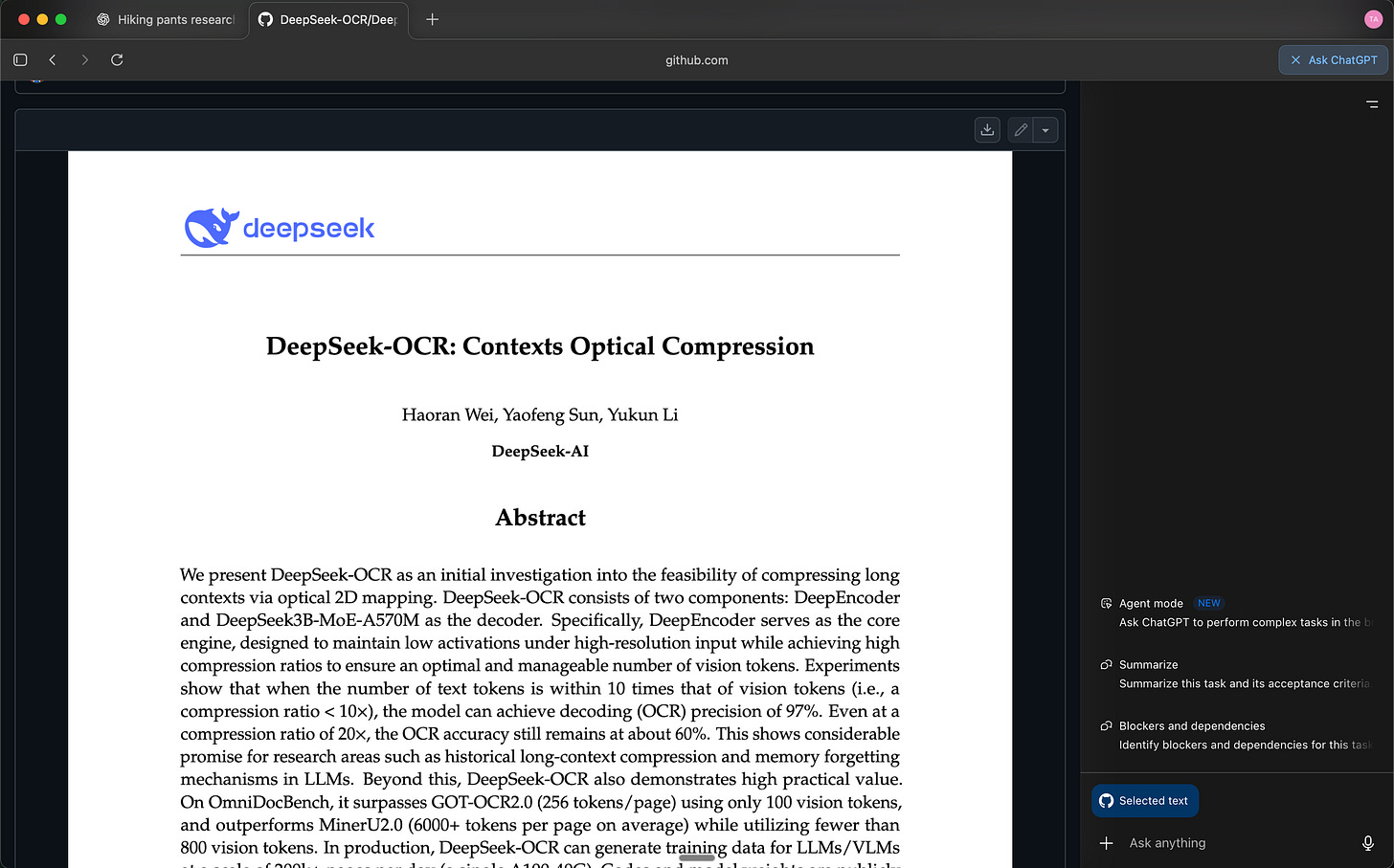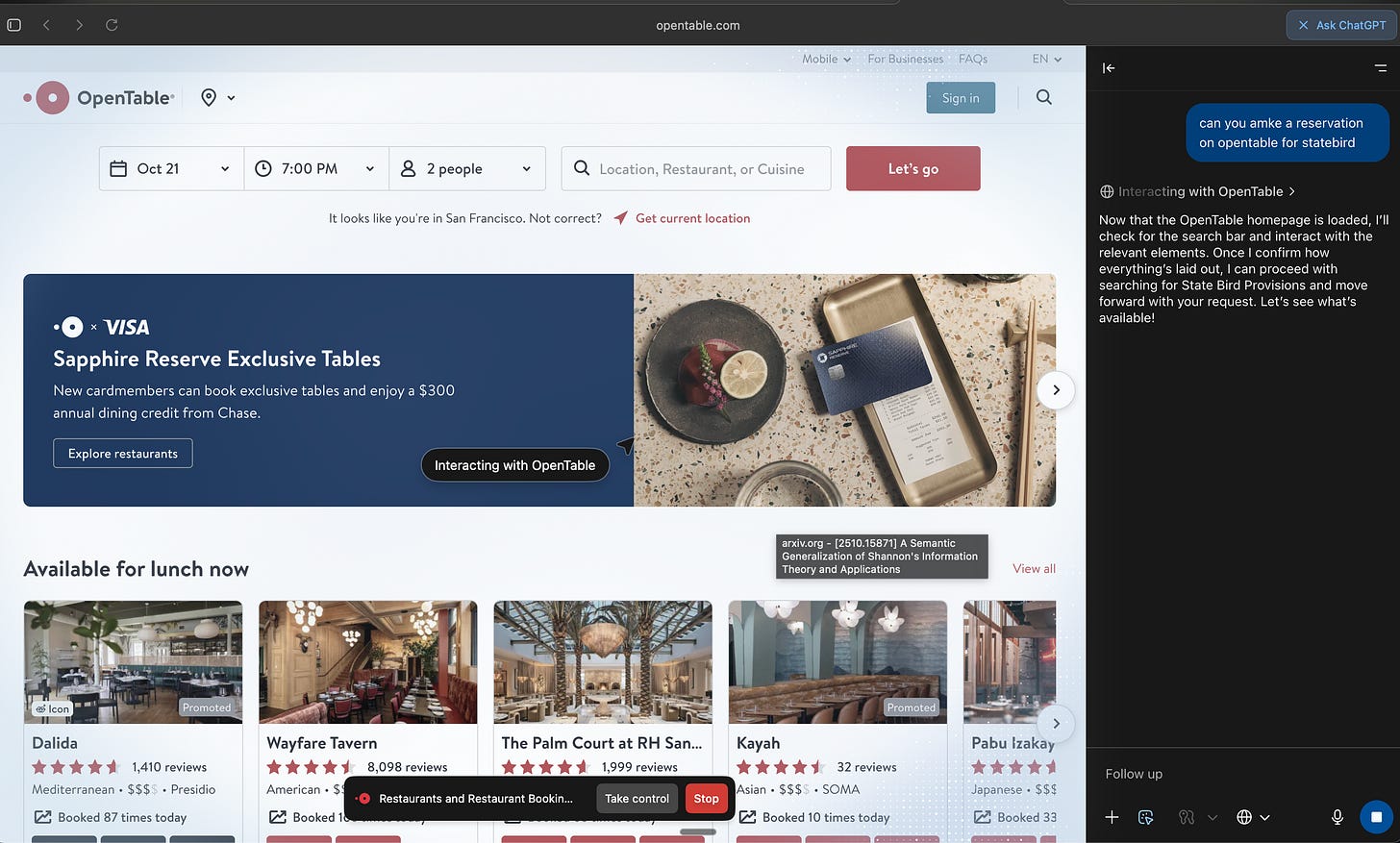OpenAI’s Atlas Browser
The battle heats up for Intelligence as OS..
OpenAI just released Atlas, an AI browser. And on first look, it seems like they’ve finally productized what an AI browsing experience should actually be. A browser that thinks with you, remembers for you, and acts on your behalf.
After spending time with it, I think we’re seeing OpenAI’s real play here. They’re not trying to build a better Chrome. They’re trying to own the layer between you and the internet. Maybe between you and everything else.
The Three Core Features
1. Agent Mode
Agent Mode lets you delegate tasks directly. I asked it to find “best lightweight hiking pants” and it crawled through reviews to surface synthesized recommendations. Not search results. Recommendations.
The reasoning layer makes it much more dynamic. For example, I asked it to turn the recommendations into a pros and cons list, and it reformatted everything on the fly.
But it’s not perfect yet. I asked it to set me up a price alert for when a pair of pants went below $80, and it couldn’t do it.
Which made me wonder: Atlas is built on Chromium.
Could this become a trojan horse for OpenAI? If they open Atlas up to extensions and widgets built on top of their AI layer, they could effectively own the Chrome ecosystem without actually controlling Chrome.
2. Memory
This might be the most powerful feature.
From OpenAI’s head of product, Fidji Simo: “If you turn on browser memories, ChatGPT can remember the pages you visit and use that context in helpful ways.
For example, I look at a lot of gluten-free recipes but don’t always remember to make them. Now I can ask ChatGPT to make a meal plan for the week based on the latest recipes I’ve seen. And because ChatGPT agent can act on my behalf across sites I’m already signed into, I can ask ChatGPT to order everything I need on Instacart and have it at my door less than two hours later. Going forward, ChatGPT can remember that I’m gluten-free and reflect that across the rest of my experience.”
What’s interesting is how they’re doing this. Atlas isn’t just dumping your entire browsing history into the context window. Instead, I’m guessing it maintains a local capture layer that tracks lightweight metadata: URLs, page titles, timestamps, and semantic embeddings of pages you visit.
This creates what’s essentially a smart database on you the model can query when needed.
And if that context layer is portable (i.e. if it works across Atlas, the native ChatGPT apps, any future OpenAI consumer device), then this isn’t just a browser. This is intelligence as the operating system.
Which means there’s a massive opportunity to build extensions and experiences on top of the Atlas browser ecosystem. Because of that AI context layer, anything you build doesn’t just exist in isolation. It has access to a persistent, portable understanding of the user.
That’s fundamentally different from a Chrome extension or browser cookies. It’s almost like persistent, ambient memory that follows you wherever you go.
3. Always-On Sidebar
The third feature is simple: ChatGPT is always there in a sidebar. It’s a companion for reading news, papers, research, whatever you’re doing. And that constant availability drives our usage way up.
Right now it’s still a bit rudimentary. I can turn a sidebar chat into a notebook or canvas, but it’s hard to combine different notes or threads. That part feels clunky. But the core idea works.
The Killer Feature is the Killer Combo
The killer feature isn’t any one of these three things. It’s the combination. An agent that can act, a memory system that knows you, and an always-on interface that makes AI frictionless.
I tried booking a restaurant through OpenTable with Agent Mode, and it got me to the sign-in page. Was it painfully slower than me manually navigating to it and checking out myself? Yes, for now. But in the future, it could just happen in the background.
Google Search is under existential threat from ChatGPT. By building Atlas, OpenAI can bypass Google entirely and become the default interface for the internet. They’re trying to make Chrome irrelevant.
And if they succeed, the implications are wild. If Atlas becomes the primary way people interact with the web, OpenAI controls the distribution layer for information. Not just search. Everything. Shopping, research, communication, entertainment. That’s way beyond a browser.
But let’s not get ahead of ourselves. This is a 1.0 product. And there are real issues.
Agent mode feels impressive when it works, but how often does it actually work versus hallucinate or fail?
The memory system is theoretically powerful, but what happens when it misremembers? Or surfaces irrelevant context? I don’t have enough time with it to know how well the context gating actually works, but I’m skeptical. If it starts pulling up random pages I visited weeks ago in the middle of unrelated tasks, that’s going to be annoying, not helpful.
And the sidebar, while useful, is still pretty basic. You can’t really organize conversations, can’t easily reference past chats, can’t combine outputs from multiple sessions. It’s better than nothing, but it’s not great.
However, if OpenAI can actually deliver on the promise (agents that work reliably, memory that’s genuinely useful, an interface that feels natural), then they’re not just building a browser.
They’re building the next platform. Intelligence as the OS. Your AI context layer follows you everywhere, across every device, every app, every interaction.



